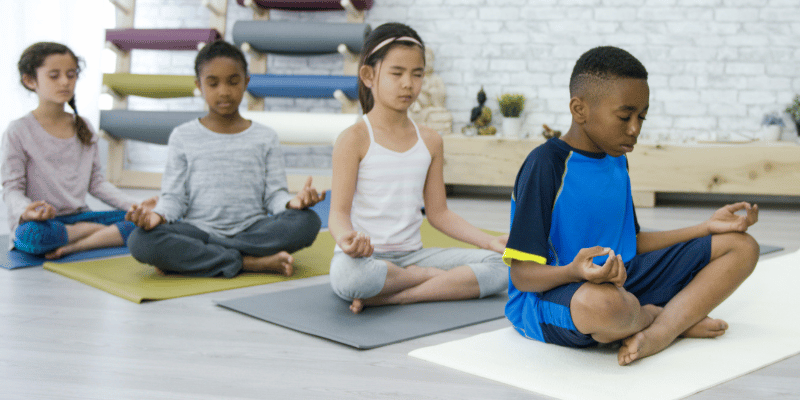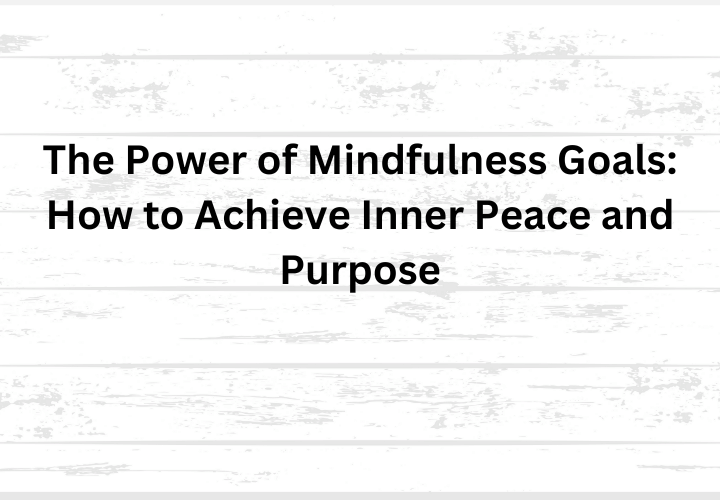Being mindful is not simply extinguishing toxic thoughts in your head, instead, it requires you to be self-aware and make choices that are representative of this self-awareness. In turn, mindfulness goals then become a heightened sense of awareness that an individual has towards their own needs and those around them, and to make room for improvement through the goals.
To prove this, a medical study can be included which found mindfulness exercises every day resulted in stress relief, lowered blood pressure, and improved the sleep of participants. Now imagine, what role can mindfulness meditation practice play in creating mindful awareness, positive emotions, and setting effort-based goals.
To help you achieve this, here is an article on mindfulness goals and how to achieve them
The Relationship between Mindfulness and Goal Setting


This is probably the first time you have heard the words ‘mindfulness’ and ‘goals’ together. But, please do not get confused, setting mindful goals is a normal practice that has been followed by sports professionals and meditative gurus, and now you can develop this practice for your mindful life.
The way it works is:
- Mindfulness Can Help You Set the Right Goals
To reach a more mindful life, you begin with a self-evaluation to figure out personal values and external factors to make a mental note about what needs to be improved. The role mindfulness plays in this regard is to recognize goals that play a key factor in becoming mindful individuals. For this, you begin with practicing mindfulness for an effective practice altogether and identify areas of improvement to set outcome-based goals
- Set Small Goals That Facilitate Mindfulness
Being mindful means to be habitually paying attention and taking small steps toward your dream job. Sudden and big shifts are never part of setting mindful goals, instead, you have to facilitate mindfulness by being subtle. This means that mindfulness relates to goal setting in the form of self-concordant goals, which are capable of being molded on the basis of positive feedback or personal values.
Why It’s Hard To Hit Our Goals According To Neurosciences


You may think changing behavior is simply a matter of setting an alarm, finding the motivation and then finally doing it. Yes, it is but from the neuroscience perspective, setting goals for new behavior can literally rewire your brain.
However, good news for you, there are ways that you can improve your prospects of achieving goals at the neuronal level according to new research
- Make Your Goal a Habit
To become mindful people, it is not necessary that you become better goal setters, but the chances of achieving goals are much higher at a minimum threshold. What I mean by this is that appreciate yourself on small wins and work on the trait of mindfulness that represents your authentic self. These are lifelong changes, so they will take time to develop.
- How to Make Sure Your Goals Aren’t Entangling
However, including mindfulness in daily practice is not enough. In addition, you must also build on cohesive thoughts and become goal-setters with an ultimate goal in mind. This means that instead of confusing yourself with goals in areas of finance, family, personal, career, etc. focus on one self-concordance goal that gives you a greater ability to achieve the dream.
- Treat Your Goals as Reminders
Another way to support neuronal rewiring is to give it time. Do not rush yourself into a goal, but work on goals to become a habit. Your physical sensation, emotional well-being, financial wellness, etc. must all be considered in setting goals, even if the goal is to fall asleep on time.
With these tips, the neuroscience perspective states that achieving goals can become a reality because you will be giving your brain wiring the time to be rewired.
4 Science-Backed Tips to Help You Reach Your Mindfulness Goals


To become more satisfied with your life, research posits certain habits that can help you reach mindfulness goals. These are:
- Sleep is Important
Getting an average 8 hours of sleep every day is a human requirement, and research states that lower than that can have consequences on the individual’s physical health as well as mental health. This is why, if you are not energized and well rested, then achieving goals is unlikely.
- Exercise Must be Done Regularly
To move in the right direction, exercise can be used to enhance your chances to be fully present and be paying attention to mindfulness goals. Exercise teaches patience and the fact that instant gratification is not effective in the long run. So, daily exercise is key to well-being through long-term goals.
- Diet Determines Wellbeing


We have all heard that what you eat is what you are. Although we do not claim that the spaghetti you ate last night is the reason for your good mood today, but research shows links between a good diet and well-being. As long as you are receiving optimal nutrients, it is inevitable that you feel well-nourished and are not low on energy. As a consequence, you feel emotionally well and happy, so focus on your diet and cut down on things that make you feel bad feelings.
- Social Support is Relevant
A good new habit for a person looking to build on their mindful goals that are self-concordant is to check in on your loved ones. What you will be doing with setting meaningful goals in this area is that you will avail the present moment to improve your relationship with a loved one. As a result, they will have your support and theirs. In this way, kindness, empathy, compassion, and confidence building can be done through social support, which inadvertently improves your well-being as well.
How Do I Practice Mindfulness And Meditation?


Meditation is not as complicated as one might think. It is simply to set better goals or to focus on an important goal, such that there is no other distraction, thought, feeling or opinion in your head. You only focus on one thing and bring all your energies to work on that thing. It can be controlled breathing, listening, or focusing on your heartbeat, irrespective, the aim is to get rid of intrusive thoughts by focusing on a minute detail.
To practice mindfulness, meditation is of critical importance. According to a study published, this can be done by first finding a comfortable seat, focusing on the present moment and getting a sense of your future. Ask yourself questions like where you see yourself, what do you want, what do you not want and how to get it. A 30-minute to an hour-long session of this meditation will help you achieve meaningful goals, while also having a mindfulness practice.
Mindful Practices for Every Day; A Mindfulness Practice for Kids: Coming Back To the Positive


Now that you know meditation can be used for setting goals that are meaningful and also to practice mindfulness, let us look into ways you can incorporate these elements into your life.
- 5-Minute Breathing Meditation
When setting new goals for the year, perhaps look into breathing meditation. The meditation works on two mantras, long breath, and short breath. Switch between the two and only focus your sense of breathing. This will help to ground you and constitutes a great mindfulness goals
- An 11-Minute Awareness of Breath Meditation
The difference between breathing meditation and awareness of breath meditation is all based on your senses. In this exercise, set yourself an alarm for 11 minutes and in that time one by one remove all distractions from your head. As a goal for practicing mindfulness, it is a great way to control and observe your rhythms and forego other thoughts
- Loving-Kindness Heartscape Meditation
For this meditation, sit comfortably and in the first breath bring to mind a person who is easy to love, then in the second breath bring to mind a person who is hard to love and in the third breath bring yourself into your mind. Repeat these steps again and again until you start showing the same kindness and love you show to the first person to the second person as well as yourself. It is a great mindfulness goal that practices kindness toward oneself and others
- A 5-Minute Mindfulness Practice: Express Gratitude
When you feel stress in your life and want to become mindful, then this meditation technique can help you to be grateful. Begin with setting a 5 minute alarm and then focusing on your breathing. With a breath in, think of something to be grateful about and with a breath out, reflect on it. In this way, you are creating awareness about your life and foregoing stress by highlighting good things about you.
Mindfulness Is About More Than Just Stress Reduction


Although mindfulness and stress reduction go hand in hand, it may be surprising to know that meditation serves much more purposes than just stress reduction. In the review by Harvard, it has been noted that meditation is critical in treating depression or anxiety, but it can improve your sleep, act as a complementary therapy during cancer treatment or for pain reduction for chronic conditions. Not only this, but research found meditation to play a key role in lowering blood pressure and improving heart rate because it helps you focus on your core.
5 Common Mindfulness Meditation Questions


After scavenging the internet for meditation, we have found a few queries that are commonly asked by those who are new to meditation, so here it goes
- Where do I place my focus?
The purpose of meditation is to get rid of distractions, so put your focus on one thing only. That one thing should be from your 5 senses; sight, smell, hearing, taste, or touch. A few are more common than others, but you can even meditate by focusing on your taste or sight
- Is it necessary to sit down?
There is no hard and fast rule to sitting while you are meditating. The Korean form of meditation even argues that meditation can be done during routine activities, like brushing your teeth or washing the dishes. As long as you are focusing on one single thing, you are meditating
- Can there be music?
Yes, of course, you can. If music helps you focus, then you can play music, however, be careful you don’t start singing along and forget the purpose of your meditation session
- Do I need to meditate daily?
Depending on your needs, you can meditate as often as you want. It can be once a day or multiple times throughout the day, as well as once a week or month. Whatever works for you!
- What intention should I put in my meditation practice?
Your intention before meditation must be clear. As seen from our discussion, meditation can be done for a number of reasons, including removing distractions, easing stress, planning goals etc.
FAQ’s
What Are Some Mindfulness Goals?
5-minute breathing exercise
What Is A Smart Goal For Mindfulness?
11-Minute Awareness of Breath Meditation
What Are The 7 Principles Of Mindfulness?
- Non-judging
- Patience
- Beginner’s Mind
- Trust
- Non-Striving
- Acceptance
- Letting Go.
What Is Mindfulness Goal And Objective?
Breathing Compassion In And Out
In this type of new goal for mindfulness practice, you focus on compassionate words while you breathe in and out. For example, when you breathe in, think ‘I am enough’, while breathing out compassion means to be kind and compassionate to others around you.
What Are The 5 Concepts Of Mindfulness?
- Awareness
- Open attitude
- Non-judgmental
- Compassion
- Energy
How Does Mindfulness Help Achieve Goals?
If you have excess stress and you set a mindful goal to be generally pursued against oncoming negative thoughts, then the neurons in your brain are shifted, molded, and changed to support this new behavior. Therefore, it is not just external pressures that can limit reaching your goals, your internal brain wiring or brain cells are being changed so reaching the desired behavior may take some time, and that is the reason why it can be hard to achieve goals.
Through this article, we hope you have now found out ways in which mindfulness can become a part of goal setting, which can then be used to uphold values of meditative and a positive mindset. It is evidently clear that mindfulness is a gradual and continuous process, which requires various kinds of goals, and meditation itself can also help in setting and achieving those goals.



